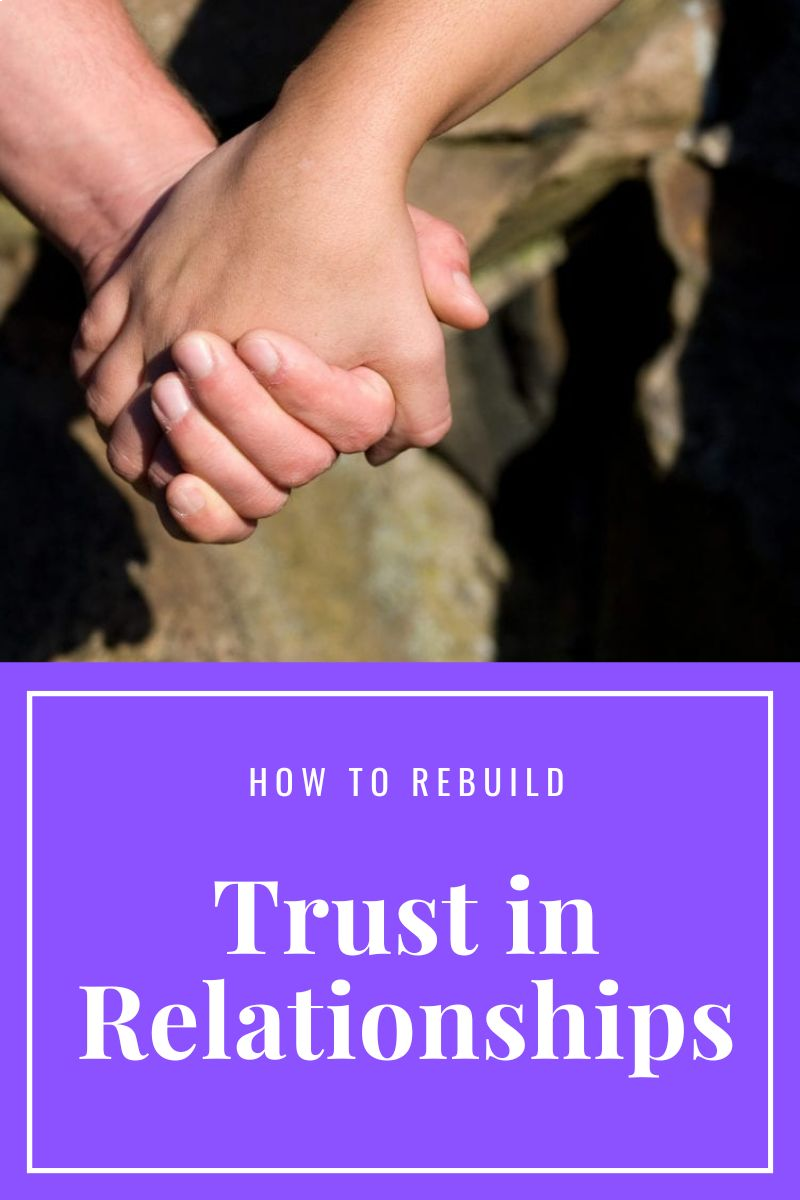We are a professional review company that receives compensation from companies whose products we review. We test each product thoroughly and give high marks only to the ones that are the very best. We are independently owned, and the opinions expressed here are our own.
Breakups are never easy, especially when trust issues have played a role in the dissolution of the relationship.
Rebuilding trust in a relationship can be a challenging but rewarding journey. Trust is the foundation of any strong partnership, and when it’s been eroded, knowing how to rebuild it is crucial. Our comprehensive guide, “Rebuilding Trust in Relationships,” provides valuable insights and actionable steps to help you mend the trust that may have been damaged in your relationship.
In this guide, you’ll discover:
- Self-Reflection and Understanding: Learn how to identify trust issues, examine recurring patterns, and explore your own feelings and fears regarding trust.
- Open and Honest Communication: Discover the power of effective communication, including tips on vulnerability, transparency, and productive dialogue.
- Setting Clear Boundaries: Understand the significance of boundaries and how they can prevent misunderstandings and promote security.
- Consistency and Reliability: Find out why consistent and reliable behavior is essential for rebuilding trust.
- Patience and Understanding: Learn how patience and empathy play a pivotal role in the trust-rebuilding process.
- Seeking Professional Help if Necessary: Explore when and how professional therapy or counseling can be a valuable resource in rebuilding trust.
- Rebuilding Trust in Yourself: Understand the importance of self-trust and gain insights into how to nurture this inner foundation.
Rebuilding trust takes commitment, self-awareness, and a willingness to change. Our guide offers a roadmap to help you heal your relationship and create a stronger, more resilient bond with your partner.
In this guide, we’ll explore actionable steps to help you rebuild trust and heal your relationship.
1. Self-Reflection and Understanding
Before you can rebuild trust, it’s crucial to understand the factors that led to its erosion in the first place. Take some time for introspection and consider the following:
Identify Specific Trust Issues
To rebuild trust successfully, you must first identify the specific trust issues that contributed to the breakup. Trust issues can take various forms, such as infidelity, dishonesty, jealousy, or a lack of communication.
Understanding the root causes of these issues is crucial to addressing them effectively.
For instance, if infidelity was a factor, it’s essential to explore why it happened. Was it a result of personal insecurities, a breakdown in emotional connection, or external factors?
Identifying these specifics helps you comprehend the complexity of the trust issues involved.
Examine Recurring Patterns
Trust issues often manifest as recurring patterns of behavior or communication that damage the relationship. Take a closer look at these patterns and consider how they contributed to the erosion of trust.
Were there consistent misunderstandings, arguments, or moments of dishonesty?
Understanding these patterns provides insight into how trust was gradually eroded over time. It’s essential to recognize when and how these patterns emerged to break the cycle and create healthier dynamics.

Explore Personal Feelings and Fears
In addition to external trust issues, it’s equally important to explore your own feelings and fears regarding trust within the relationship. Trust is not only about trusting your partner but also about trusting yourself to make sound decisions and judgments.
Reflect on your own insecurities, anxieties, or past experiences that may have influenced your trust issues. Are there unresolved emotional wounds from previous relationships that impact your ability to trust fully? Identifying these personal feelings and fears enables you to work on self-healing, which is a crucial step toward rebuilding trust.
By diving deep into these aspects of self-reflection and understanding, you’ll gain a clearer picture of the trust issues that need to be addressed and the personal growth required to rebuild trust successfully.
For insights on how to build trust in relationships, read the article Building Trust in New Relationships next.
2. Open and Honest Communication
Effective communication is the cornerstone of rebuilding trust in any relationship. When trust has been eroded, honest and open dialogue becomes even more critical.
Here, we’ll explore the importance of open communication and provide actionable tips for fostering it in your efforts to rebuild trust.
Why Open Communication Matters
Open communication serves as the foundation for rebuilding trust for several reasons:
1. Rebuilding Understanding:
Misunderstandings often contribute to trust issues. Through open communication, you can clarify intentions, express emotions, and gain a deeper understanding of each other’s perspectives. This paves the way for resolving past conflicts.
2. Reestablishing Transparency:
Trust is closely tied to transparency. Being open about your thoughts, feelings, and actions demonstrates a willingness to rebuild trust. It shows that you have nothing to hide and are committed to rebuilding the relationship on an honest foundation.
3. Creating Emotional Connection:
Emotional disconnection can be a significant factor in trust issues. Open communication allows you to reestablish an emotional connection with your ex-partner. It shows that you care about their feelings and are willing to address any concerns they may have.

Tips for Open and Honest Communication
- Active Listening: Practice active listening by giving your full attention to your ex-partner when they speak. Avoid interrupting, and ask clarifying questions to ensure you understand their perspective.
- Express Vulnerability: Trust rebuilding requires vulnerability. Share your thoughts and emotions openly, even if they make you feel exposed. Vulnerability can lead to greater emotional intimacy.
- Use “I” Statements: When discussing sensitive topics, use “I” statements to express your feelings and needs. For example, say, “I felt hurt when…” instead of “You always…”
- Avoid Blame: Blaming your ex-partner for past issues is counterproductive. Focus on describing your feelings and experiences rather than assigning blame.
- Set Regular Communication Times: Establish a routine for open communication. Regular check-ins can help you both feel more secure and connected.
Read More on Effective Communication
If you’re eager to dive deeper into the art of effective communication and its role in rebuilding trust, we recommend reading our informative article: “Mastering the Art of Communication.” This article offers additional strategies, real-life examples, and expert insights to help you on your journey to reconnecting with your ex-partner.
In this article, you’ll discover:
- Proven techniques for active listening.
- Strategies for expressing vulnerability without fear.
- Tips for managing difficult conversations with empathy.
- Insights from relationship experts on the power of open communication.
Click or tap here to read the article Mastering the Art of Communication.
By enhancing your communication skills and actively practicing open and honest dialogue, you can pave the way for rebuilding trust and creating a stronger, more resilient relationship with your ex-partner.
3. Set Clear Boundaries
Setting clear boundaries is an integral part of rebuilding trust in a relationship. Boundaries create a framework for understanding each other’s expectations and behaviors, reducing the chances of misunderstandings that can erode trust.
The Significance of Clear Boundaries
Clear boundaries play a pivotal role in rebuilding trust for several reasons:
1. Defining Acceptable Behavior:
Boundaries help both you and your ex-partner understand what is considered acceptable behavior within the relationship. When trust has been damaged, establishing these parameters is essential to prevent future breaches of trust.
2. Rebuilding Security:
Trust is closely linked to a sense of security. Knowing the boundaries and expectations within the relationship creates a feeling of safety and predictability, which is vital for rebuilding trust.
3. Avoiding Misunderstandings:
Lack of clarity can lead to misunderstandings that perpetuate trust issues. Clear boundaries reduce the chances of misinterpreting each other’s actions or intentions.
Tips for Setting Clear Boundaries
- Identify Key Issues: Start by identifying the specific trust-related issues that need boundaries. This could include areas such as communication with members of the opposite sex, privacy, or financial transparency.
- Discuss and Agree: Initiate a conversation with your ex-partner about the boundaries you both feel comfortable with. Discuss each issue individually and agree on the boundaries that will be established.
- Be Specific: Ensure that boundaries are specific and clearly defined. Vague boundaries can lead to confusion. For example, instead of saying, “Be more honest,” specify, “Share all financial information.”
- Mutual Consent: Both parties should consent to the boundaries. It’s crucial that neither feels forced into accepting rules they are uncomfortable with.
- Regularly Review: Boundaries may need adjustment as the relationship progresses. Schedule regular check-ins to review and adapt the boundaries to the evolving needs of the relationship.
Setting clear boundaries provides a roadmap for trust rebuilding, helping you and your ex-partner navigate the path to a more secure and trusting connection.
For more tips, please read the article Respecting Boundaries next.

4. Consistency and Reliability: The Bedrock of Trust
Rebuilding trust requires consistency and reliability in your actions and behavior. These qualities demonstrate your commitment to change and your dedication to rebuilding trust.
The Significance of Consistency and Reliability
Consistency and reliability are fundamental to rebuilding trust for several reasons:
1. Demonstrating Trustworthiness:
Consistency in your actions and reliability in keeping promises show your ex-partner that you are trustworthy. Trust is built when they can depend on you without hesitation.
2. Rebuilding Predictability:
Trust is closely linked to predictability. Being consistent and reliable in your behavior creates a sense of predictability, which is comforting and reassuring for your ex-partner.
3. Overcoming Past Doubts:
If trust was damaged due to past inconsistencies or broken promises, consistent and reliable behavior over time can help overcome those doubts and rebuild confidence.
Tips for Consistency and Reliability
- Follow Through on Commitments: Make a conscious effort to follow through on your commitments, no matter how small. Whether it’s a promise to call, meet, or take care of a task, consistency in keeping your word is vital.
- Open Communication: If you foresee any challenges in fulfilling a commitment, communicate openly and promptly with your ex-partner. Honest communication about potential delays or issues fosters trust.
- Transparency About Actions: Be transparent about your actions and whereabouts. Transparency helps eliminate doubts and suspicions that can erode trust.
- Build a Routine: Establishing routines can help create a stable and reliable environment. Consistent daily habits and practices contribute to a sense of security.
- Acknowledge Mistakes: If you make a mistake or fail to keep a commitment, acknowledge it and take responsibility. Apologize sincerely and demonstrate your commitment to doing better in the future.
Consistency and reliability are powerful tools in the trust-rebuilding process. By embodying these qualities, you can demonstrate your commitment to change and your dedication to rebuilding trust.

5. Patience and Understanding: Nurturing Trust Over Time
Rebuilding trust is a process that requires patience and understanding, both for yourself and your ex-partner. Trust is not rebuilt overnight, and it’s essential to recognize and manage the challenges that may arise along the way.
The Significance of Patience and Understanding
Patience and understanding are key components of trust rebuilding for several reasons:
1. Healing Takes Time:
Trust issues can leave emotional wounds that need time to heal. Patience allows for the gradual restoration of emotional well-being.
2. Managing Doubts and Insecurities:
Both you and your ex-partner may have doubts and insecurities as you work to rebuild trust. Understanding each other’s feelings and providing reassurance is essential.
3. Avoiding Rushed Decisions:
Rushing the trust-rebuilding process can lead to hasty decisions and setbacks. Patience allows you to make thoughtful choices that contribute to lasting trust.

Cultivating Patience and Understanding
- Self-Reflection: Take time for self-reflection to understand your own feelings and frustrations. Recognize that trust rebuilding is a journey with ups and downs.
- Active Listening: Be an active listener when your ex-partner expresses their doubts or concerns. Validate their feelings and show empathy.
- Manage Expectations: Understand that rebuilding trust is a gradual process, and setbacks may occur. Manage your expectations and stay committed to the long-term goal.
- Seek Support: Consider seeking support from friends, family, or a therapist to help you manage your emotions and maintain patience.
- Practice Empathy: Put yourself in your ex-partner’s shoes and try to understand their perspective. Empathy fosters a deeper connection and mutual understanding.
Cultivating patience and understanding is crucial for navigating the challenges that arise during trust rebuilding. It’s a testament to your commitment to healing and creating a healthier, more resilient relationship.
If you want some insights, the article Patience and Perseverance will be helpful to you, especially if you’re a woman.
6. Seek Professional Help if Necessary: Guidance on the Path to Trust
In some cases, rebuilding trust may benefit from the guidance of a relationship therapist or counselor.
Professional help can provide a neutral space for both parties to address trust issues and learn effective communication and conflict resolution skills.

When Professional Help is Beneficial
Seeking professional help can be beneficial when:
- Trust issues persist despite your best efforts to address them.
- Communication breakdowns are frequent, and conflicts remain unresolved.
- There are deep-seated emotional wounds or trauma that require specialized guidance.
- Both you and your ex-partner are committed to rebuilding trust and are open to the therapeutic process.
Benefits of Professional Help
Professional therapy or counseling offers several advantages:
- Neutral Mediation: A therapist provides a neutral, non-biased perspective and mediates discussions, reducing the potential for conflicts.
- Effective Communication: Therapists teach effective communication and conflict resolution skills, empowering both parties to express themselves constructively.
- Emotional Healing: Therapy can address underlying emotional wounds and trauma, facilitating emotional healing and trust rebuilding.
- Customized Guidance: Therapists tailor their guidance to your specific relationship dynamics and trust issues.
- Accountability: Therapy sessions create a structured environment that promotes accountability for both parties.
How to Seek Professional Help
- Research Therapists: Look for licensed therapists or counselors with experience in couples or relationship therapy.
- Schedule an Appointment: Contact potential therapists to schedule an initial appointment. Many therapists offer consultations to discuss your needs and assess whether they are a good fit for your situation.
- Commit to the Process: Rebuilding trust with professional help requires commitment from both you and your ex-partner. Attend sessions regularly and actively engage in the therapeutic process.
Professional help can be a valuable resource for couples committed to rebuilding trust. It provides a structured and supportive environment for addressing trust issues and working toward a healthier, more trusting relationship.

7. Rebuilding Trust in Yourself: The Inner Foundation
Trust isn’t solely about rebuilding trust with your ex-partner; it also involves trusting yourself. This self-trust is an essential foundation for rebuilding trust in the relationship. In this section, we’ll explore why trusting yourself is crucial and how to nurture this inner foundation.
The Significance of Trusting Yourself
Trusting yourself is vital for several reasons:
1. Self-Confidence:
Self-trust boosts your self-confidence and self-esteem, which are essential for building healthy relationships.
2. Better Decision-Making:
When you trust yourself, you make decisions from a place of self-assuredness, which can lead to better choices in relationships.
3. Emotional Resilience:
Self-trust provides emotional resilience, helping you navigate challenges and setbacks with greater ease.
Nurturing Self-Trust
- Self-Reflection: Take time for self-reflection and self-awareness. Understand your strengths, values, and areas where you can improve.
- Forgive Yourself: If past actions contributed to trust issues, practice self-forgiveness. Understand that people make mistakes, and growth is possible.
- Set Boundaries: Establish personal boundaries that align with your values and needs. Boundaries help you protect your self-trust.
- Practice Self-Care: Prioritize self-care to maintain emotional and mental well-being. Self-care builds self-trust by showing that you value yourself.
- Seek Support: If you struggle with self-trust, consider therapy or counseling to address underlying issues and build a stronger sense of self.
Trusting yourself is an ongoing process that requires self-awareness, self-compassion, and self-care. It forms the basis for rebuilding trust not only within yourself but also in your relationships.

How to Rebuild Trust in Relationships
In conclusion, rebuilding trust with your ex-partner is possible, even if trust issues were a significant factor in the breakup. By engaging in self-reflection, open communication, setting clear boundaries, consistent behavior, and being patient, you can work together to rebuild the foundation of trust and create a healthier, more resilient relationship.
Remember that trust takes time to rebuild, and both parties must be committed to the process. With patience, understanding, and a willingness to change, you can heal and strengthen your relationship.
To your success,




What do you think about the article you've just read? Please tell me below.